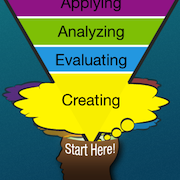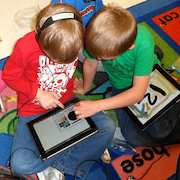A “Connected Educators Month” in the United States — the rapid rise of Twitter PD — the coming of age of the Personal Learning Network. No question: It’s been an historic year for connected professionals, including PLP’s extended family of teacher and school leaders. Here’s just one example: the Top 13 Most-Read Posts by our Voices from the Learning Revolution group bloggers for the year just past.
Each article listed here scored more than 4,000 pageviews during 2012. Now’s a great time to read (or re-read) them, as you resolve to connect and make a difference in 2013!
Flipping Bloom’s Taxonomy
May 15
23,919
I think the revised Bloom’s Taxonomy is wrong. I agree that the taxonomy accurately classifies various types of cognitive thinking skills. It certainly identifies the different levels of complexity. But its organizing framework is dead wrong. Here’s what I propose. In the 21st century, we flip Bloom’s taxonomy. Rather than starting with knowledge, we start with creating, and eventually discern the knowledge that we need from it. Read it here.
The Flip: End of a Love Affair
Shelley Wright
October 8
21,528
Many teachers who opt for the flipped classroom strategy are not pursuing a student-centered approach to teaching and learning, says Shelley Wright. The traditional model is simply being reversed — not reinvented. The lecture (live or on video) is still front and center. “Learning isn’t simply a matter of passively absorbing new information while watching a lecture on video,” she says. “New knowledge should be actively constructed.” Read it here.
Live from the iPad Summit
November 15
6,535
Teacher Jen Carey left the first iPad Summit, held at the Harvard Medical School, with three takeaways: the iPad is just a remarkable piece of hardware; iPad implementation requires large-scale professional development; and if iPad implementation doesn’t redefine the way educators use technology to create and perform tasks, it’s not worth the investment. Read it here.
Blogging: The New Persuasive Essay
Shelley Wright
June 22
5,910
I think blogging is the new persuasive essay. If we’re trying to prepare our students to think critically and argue well, they need to be able to blog. It allows for interaction. It allows for ideas to be tested. And the best posts anywhere in cyberspace tend to have a point that can be argued. Read it here.
Teaching in the Age of Siri
Marsha Ratzel
October 23
5,809
Short of banning smartphones (a short-term solution, at best), Marsha Ratzel thinks the evolution of AI services like Siri “means that the problems I pose for my 8th grade math students will have to shift from a focus on finding the answer as the endpoint — to a greater focus on analysis. What does that answer mean in a real-life situation?” And how might teachers in other content areas have to rethink their teaching and assessment strategies, with Siri at students’ beck and call? Read it here.
Dropbox: A Superb Classroom Tool
Jennifer Carey
August 10
5,567
Dropbox is many things — a multifaceted tool that’s so powerful, you’ll continue to discover new ways to use it. But the short and sweet of it is this: you can use it to store and sync documents and files across computers, tablets, and smart phones. And it’s great for teaching and school. Read it here.
I Used to Think…
November 8
5,315
I used to think I was a pretty good teacher. Now I realize that I did the best I could with the knowledge I had, but my classroom was woefully inadequate for many of my students. I failed to equip them with what they needed. I now believe my students are competent to show me what they need, if only I take the time to listen and ask authentic questions. I’m becoming a better teacher by giving up a lot of what I used to think. Read it here.
Encouraging Teachers to Teach Creativity
Margaret Haviland
June 5
5,023
As the person most directly responsible for our school’s professional learning, I have been wondering what professional development looks like when you turn Bloom’s on its head and ask teachers to encourage students’ creative thinking early in the learning process. Teachers need to model their own creative thinking and embrace “messy” assessments. Read it here.
Getting PBL Right
Peter Skillen
July 13
4,855
PBL is a construct made up by human beings — there are lots of variations! And you are entitled to construct your own version within some parameters. Study many of the great resources that are available to you and then create your own working definition and effective PBL practice. And consider our Continua Frame. We like to think with it, rather than dichotomies, simply because things are rarely on or off, black or white, ones or zeroes! Read it here.
iPads in Primary: Does 1-to-1 Make a Difference?
July 2
4,335
Management of our iPads is more of a hassle than I had anticipated. But it is clear to me that these devices ARE making a difference. When I see the students’ engagement, their learning, their sharing and their pursuit of their passions, I can’t help but be convinced that these devices have the potential to transform my classroom. Read it here.
Teaching with SmartPhones
Jennifer Carey
November 21
4,238
When educators combine the modern smartphone with wireless internet access and the remarkable number of cheap and free mobile apps now available, the phones become truly amazing pocket-sized learning devices. Teacher Jennifer Carey tells how she’s using smartphones in her classroom: to charge up lessons, promote research and fact-checking, and harness powerful mobile apps to expand learning. Read it here.
Developing Students as Active Citizens
Margaret Haviland
July 18
4,218
The question becomes, how do we translate our history students’ understanding of past actors into action by young people today? In March we decided to chuck the traditional exam format and craft a project to help students make this connection and consider what it means to be an engaged citizen. Read it here.
What Do We Mean by Authentic Learning?
April 21, 2011
4,113 (in 2012) 5,261 (total)
Administrators, what do you look for when you spend time in classrooms? What do you listen for? Teachers, how do you know authentic, real, meaningful, passion-filled learning is happening before your eyes? How often do we take the time to ask children what learning means to them? Read it here.
John Norton
Latest posts by John Norton (see all)
- I'm a "Learner First" in a Whole New World - July 1, 2013
- Hale@home: Easing Student Transitions via Online Learning - May 17, 2013
- Our Top 13 Voices Posts for 2012! - January 1, 2013






